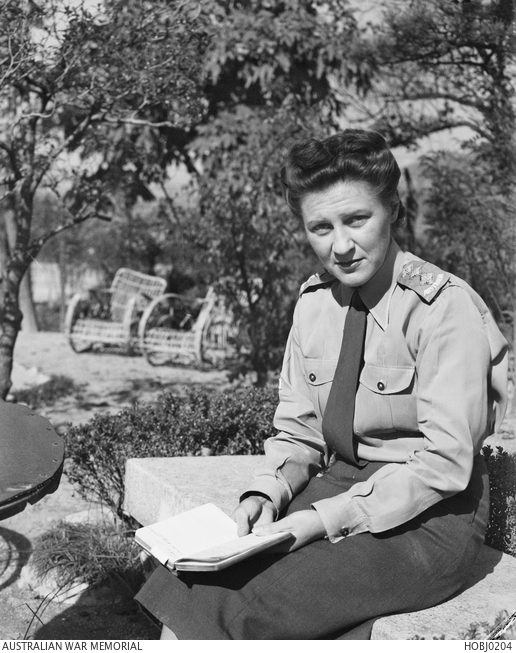Perditta McCarthy: A remarkable lady, with an indomitable spirit and a wonderful sense of humour
Born in 1916, Perditta Marjorie McCarthy’s life spanned almost a century. “Ditta” McCarthy, of Wagga Wagga, NSW, died peacefully in her sleep last weekend on 10 March after a long battle with failing health. She was 96. The Royal Australian Army Nursing Service has lost its highest ranking officer.
McCarthy trained at the Sydney Hospital, graduating in 1939. She served with the Second AIF as a member of the Australian Army Nursing Service which later became the Royal Australian Army Nursing Service, and then the Royal Australian Army Nursing Corps (RAANC). She saw considerable overseas service spanning several conflicts, initially in Papua New Guinea during the Second World War, then with the British Commonwealth Occupation Force in Japan, on to Korea, then Malaya, and finally Vietnam.
Captain McCarthy takes a break in the grounds of the British Commonwealth General Hospital during her service with BCOF in Kure, Japan in 1950.
McCarthy later wrote of her time spent nursing the wounded at the BCOF General Hospital at Kure in Japan during the Korean War in 1950:
The real horrors of the Korean War were "brought home" to me when I was allocated for duty in the Burns Ward of the BRITCOM Hospital ... Many were bandaged from head to foot, with only slits for their eyes and mouths, and obviously in great pain, which we attempted to alleviate with what "pain killers" were available at the time. Rarely - if ever - did they complain. Their youthful eyes would "light up" as we bent over them to dress their wounds or to apply medication. Their eyes also revealed their suffering and pain, their stoicism under such traumas had to be witnessed to be believed. As we approached the Burns Ward, to report for duty, the stench from putrefying flesh was overpowering, the memory of which remains with me to this day.
Patient Private B.G 'Knobby' Tranter of 3RAR, chats with the matron, Captain McCarthy at the BCCZMU in Seoul in 1953.
In 1953, McCarthy was posted to the British Commonwealth Communications Zone Medical Unit (BCCZMU) which was located in a suburb on the outskirts of Seoul in Korea. The hospital was in a bombed out, two storey school building, and the nurses lived and worked under Spartan conditions, with no fresh running water and few personal comforts. McCarthy recalled the initial opposition and resentment the women experienced in what had formerly been perceived as a male domain so close to “the front”.
There were some very heated verbal confrontations and even the "pulling of rank", which is virtually unknown in Nursing Corps. Drastic situations demand drastic action. All we wanted to do was to nurse and care for our wounded. All problems were eventually resolved and we slowly became accepted as an integral part of the “team".
Despite the lack of facilities and equipment, Matron McCarthy and her nurses determined that their “hospital” would be “the cleanest, most hygienic, germ and bacteria free establishment in Korea. This entailed the continual scrubbing and washing down of floors, walls, beds etc with what soap, detergents and antiseptics we could beg, borrow or steal.”
McCarthy believed that “humour was the element that allowed us to retain our sanity. It came from the staff and from our patients, who despite serious wounds, would continually tell jokes and take "the mickey" out of their fellow diggers and officers.”
With a long and distinguished career as a military nurse, McCarthy held many appointments, her last being as Matron-in-Chief of the RAANC. Before her retirement she was promoted to brigadier, the only nursing officer to reach such a rank. She was awarded the Associate Royal Red Cross in 1954 and the Royal Red Cross in 1972 for her dedication and service to nursing.
Never one to remain idle for long, McCarthy kept busy for many years in her retirement working as a volunteer at the Army Museum in Victoria Barracks, Sydney. She was also responsible for the research and writing of several biographies of colleagues and predecessors from the Army nursing fraternity.
Of the late Brigadier Perditta McCarthy it can genuinely be said that “she served the Army with distinction.”
While Director of the RAANC, Colonel McCarthy visited several hospitals in Vietnam in 1971. Major J.S. Vercoe, Officer Commanding 8th Field Ambulance escorted her around the Baria Hospital in Phuoc Tuy Province, where she visited local patients.
More information
Our current exhibition is Nurses: from Zululand to Afghanistan



